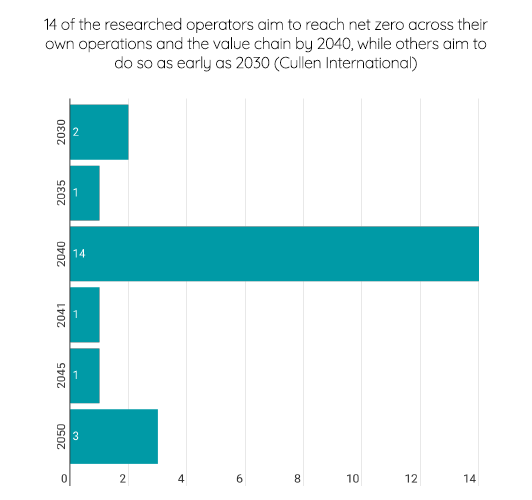22 out of 32 studied European incumbent telecoms operators now have targets to reach carbon neutrality across their operations and supply chains (scopes 1-3). Other operators, such as OTE and Telekom Slovenije have introduced targets to become carbon neutral in their own operations (scopes 1 and 2), while Magyar Telekom has been carbon neutral in its own operations since 2015.
Carbon neutrality is achieved when the amount of CO2 a company emits is matched by the amount of CO2 that is absorbed, for example through carbon offset programs.

One way that operators seek to reduce their emissions is by entering into power purchasing agreement (PPAs) with electricity producers. PPAs are usually long-term contracts for the provision of sustainably-generated electricity.
Of the 32 operators studied, 24 have issued targets to purchase a certain amount of electricity from sustainable sources. Half of the studied operators already purchase 100% of their electricity from sustainable sources.
These are some of the conclusions from the May 2024 update of Cullen International’s benchmark on sustainability targets for incumbent telecoms operators.
For more information and access to the full research, please click on “Access the full content” - or on “Request access”, in case you are not subscribed to our Sustainability service.
more news
19 December 25
CSRD transposition: Belgium, Denmark, Finland and Slovenia transpose the “stop-the-clock” directive
Cullen International’s updated benchmark tracks the progress made by the 27 EU member states in transposing the CSRD and the related “stop-the-clock” directive.
19 December 25
Global trends in AI regulation
Our latest Global Trends benchmark compares policies and regulations on artificial intelligence (AI) across 14 jurisdictions around the world.
19 December 25
Implementation of European Media Freedom Act: general overview in 12 EU member states
Our new Media benchmark shows if there are initiatives/rules in the selected countries which aim to put into application the EU Media Freedom Act (EMFA). If yes, it describes the scope of the main measures proposed. The benchmark also provides information on the next legislative or regulatory steps.